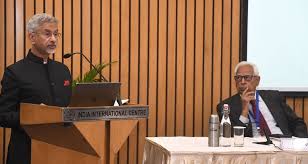NEW DELHI: Touching upon the pending Free Trade Agreement between India and the European Union, External Affairs Minister S Jaishankar today said, “It’s time we get on with it.”
He was speaking at the second edition of the annual India International Centre-Bruegel seminar today. Bruegel is a think tank from Europe.
Jaishankar reiterated his push for multilateralism on a global scale, saying different standards had been applied to countries in the East and the West. The minister called out the selective and uneven application of “matters of principle” to different countries and asserted that any global agenda could no longer by set by a handful of powers.
The minister said, “In a world that promises to be so volatile and uncertain, a stronger India-EU relationship can be an important stabilising factor”.
He said India was cognisant of the “strategic awakening” of Europe in the past few years and that could serve as a driver of deeper engagement.
“In recent years, there has been a more intensive engagement with the European Commission. We expect that to increase in the coming days,” Jaishankar said.
The minister spoke about the India-Middle East Economic Corridor, saying that it might have slowed because of the current tensions in West Asia, but had the potential to link the Far East to western Europe and beyond.
Jaishankar expressed concern over the slow transfer of resources from the developed to the developing world to fight climate change. The delay “is not a secret,” he pointed out, adding that “an exercise in climate accounting” was on.
He said, “We are truly entering a time of multi-polarity and rebalancing; the sooner we come to terms with this reality, the better it is for all of us.”
India and the EU had common interests and shared values. There might be some differences on priorities and specifics, “but what binds is a sentiment much stronger”, the minister said.
“At the end of the day, we are political democracies, pluralistic societies and market economies,” he said.


